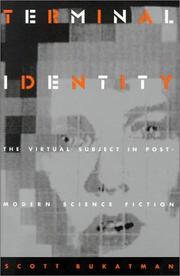| Listing 1 - 6 of 6 |
Sort by
|
Book
ISBN: 1282521047 9786612521041 0810866978 9780810866973 9780810862128 0810862123 9781282521049 661252104X Year: 2009 Publisher: Lanham, Md. Scarecrow Press
Abstract | Keywords | Export | Availability | Bookmark
 Loading...
Loading...Choose an application
- Reference Manager
- EndNote
- RefWorks (Direct export to RefWorks)
In The Postmodern Humanism of Philip K. Dick, Jason Vest examines how Dick adapted the conventions of science fiction and postmodernism to reflect humanist concerns about the difficulties of maintaining identity, agency, and autonomy in the latter half of the 20th century. Vest also explores Dick's literary relationship to Franz Kafka, Jorge Luis Borges, and Italo Calvino.
Postmodernism (Literature) --- Humanism in literature. --- Literary movements --- Literature, Modern --- Dick, Philip K. --- Criticism and interpretation.
Book
ISBN: 9780199743254 0199743258 0190498307 0190498315 Year: 2016 Publisher: New York : Oxford University Press,
Abstract | Keywords | Export | Availability | Bookmark
 Loading...
Loading...Choose an application
- Reference Manager
- EndNote
- RefWorks (Direct export to RefWorks)
Widely recognized as one of the most imaginative writers of the 20th century, Philip K. Dick helped to shape science fiction into the popular genre it is today. His stories, renowned for their sophisticated philosophical themes and startling portrayals of simulated realities, inspired numerous television and film adaptations, including the 1982 cult classic Blade Runner. Dick's personal life took on an otherwordly quality when, in 1974, he famously had a series of bizarre visions. According to Dick, a pink light beamed psychic information into his brain, awakening memories of a past life as an ancient Christian revolutionary and granting him contact with time-traveling extraterrestrials. He witnessed scenes from ancient Rome superimposed over his California neighborhood, and warned local police he was a dangerous machine programmed to self-destruct. After the visions faded, Philip K. Dick spent the rest of his life trying to fathom the meaning of what he called his "divine madness." Was it schizophrenia? Or a genuine religious experience? In The Divine Madness of Philip K. Dick, clinical psychologist Kyle Arnold probes the fascinating mystery of Dick's heart and mind, and shows readers how early traumas opened Dick to profound spiritual experiences while also predisposing him toward drug dependency and violence. Disputing the myth that Dick had schizophrenia, Arnold contends that Dick's well-known paranoia was caused by his addiction to speed. Despite Dick's paranoia, his divine madness was not a sign of mental illness, but a powerful spiritual experience conveyed in the images of science fiction.--Amazon.com.
Science fiction, American --- Psychology and literature --- History and criticism --- Dick, Philip K. --- Psychology. --- Family. --- Psychology and literature. --- History and criticism.

ISBN: 0819574546 9780819574541 0819563986 9780819563989 0819563994 9780819563996 Year: 2000 Publisher: Hanover
Abstract | Keywords | Export | Availability | Bookmark
 Loading...
Loading...Choose an application
- Reference Manager
- EndNote
- RefWorks (Direct export to RefWorks)
Selected by Choice as an Outstanding Academic Book of the Year. This innovative cultural critique offers valuable insights into science fiction, thus enlarging our understanding of critical theory.
Science fiction --- Science --- Science stories --- Fiction --- Future, The, in literature --- History and criticism --- Theory, etc. --- Lem, Stanisław. --- Russ, Joanna, --- Dick, Philip K. --- Le Guin, Ursula K., --- Delany, Samuel R. --- Science-fiction --- Histoire et critique --- Théorie, etc
Book
ISBN: 3741001430 3741003778 Year: 2022 Publisher: Marburg : Schüren Verlag,
Abstract | Keywords | Export | Availability | Bookmark
 Loading...
Loading...Choose an application
- Reference Manager
- EndNote
- RefWorks (Direct export to RefWorks)
Long description: Black Mirror, Fargo, True Detective und American Horror Story gehören zu den meistdiskutierten Serienproduktionen der letzten zehn Jahre. So unterschiedlich die Serien sind: Sie eint eine Gattungsbezeichnung, die sich als Selbstbeschreibung im Marketing der Produktionen sowie in den Besprechungen der Kommentatorinnen und Kommentatoren etabliert hat: Anthologieserie. Die Beiträge des Sammelbands setzen es sich zum Ziel, dem Anthologischen im Seriellen systematisch nachzugehen, um den Begriff im geisteswissenschaftlichen Diskurs zu profilieren. Dabei fragen die Beiträge nach den medialen Bedingungen, wie etwa den Zusammenhängen und Unterschieden von Sammlung und Reihe, von literarischen und fernsehseriellen Anthologien, sowie nach der Herkunft und den Funktionen des Begriffs. Gleichermaßen werden spezifische Erzähllogiken der Fortsetzung und Schließung sowie den daraus entstehenden Kohärenzmomenten von Anthologieserien in den Blick genommen. Damit wird gezeigt, dass der Begriff mehr ist als ein geschicktes Branding von Seiten der Produktionsstudios. Er stellt vielmehr eine operationalisierbare und analytisch belastbare Kategorie dar, die in die wissenschaftliche Untersuchung von Anthologieserien einfließen sollte.
Tatort --- Branding --- narrative --- Filmisches Erzählen --- True Detective --- Fargo --- Tales from the Crypt --- American Horror Story --- Black Mirror --- Philip K. Dick’s Electric Dreams --- Filmmarketing --- Love, Death &Robots --- American horror story (Television program) --- Advertising --- Love, Death & Robots --- Motion pictures. --- Dick, Philip K.

ISBN: 0714839647 9780714839646 Year: 2001 Volume: *3 Publisher: London: Phaidon,
Abstract | Keywords | Export | Availability | Bookmark
 Loading...
Loading...Choose an application
- Reference Manager
- EndNote
- RefWorks (Direct export to RefWorks)
Dan Graham est un des artistes conceptuels les plus influents. Les auteurs analysent son oeuvre: notion de double, de reflet et de séparation; passage du travail conceptuel à la performance, video, architecture; analyse du contexte architectural dans lequel se situe son travail
Graham, Dan --- Performance art --- Conceptual art --- Art conceptuel --- Rapport art-architecture --- Birgit Pelzer, Mark Francis, Beatriz Colomina --- kunst --- Dan Graham (° 1942, Urbana, Illinois, USA) --- twintigste eeuw --- Graham Dan --- Installaties ; performances ; film ; 1965-2000 ; Dan Graham --- Dick Philip K. --- Conceptuele kunst --- Verenigde Staten --- Kunst & architectuur ; glas ; paviljoenen --- concept art --- Videokunst --- Assemblages --- installaties --- Intermedia --- conceptuele kunst --- Kunst ; in en op openbare plaatsen --- video --- Kunst in steden --- video-installaties --- performances --- Kunst en woord --- film --- 7.07 --- glas --- 7.038 --- transparantie --- 7.071 GRAHAM --- Kunstenaars met verschillende disciplines, niet traditioneel klasseerbare, conceptuele kunstenaars A - Z --- Kunstgeschiedenis ; 1950 - 2000 --- Contemporary [style of art] --- Dick Philip K --- Graham, Dan, --- Graham, Daniel H., --- Gureamu, Dan, --- Criticism and interpretation. --- Art --- Criticism and interpretation --- United States --- Graham, Dan 1942-2022 (°Urbana, Illinois, Verenigde Staten) --- Performance art - United States. --- Conceptual art - United States. --- installatiekunst --- Art de performance

ISBN: 0822313405 0822313324 Year: 1993 Publisher: Durham, N.C. Duke University Press
Abstract | Keywords | Export | Availability | Bookmark
 Loading...
Loading...Choose an application
- Reference Manager
- EndNote
- RefWorks (Direct export to RefWorks)
82-311.9 --- 82.015.9 --- 82.015.9 Literaire stromingen: postmodernisme --- Literaire stromingen: postmodernisme --- 82-311.9 Science fiction --- Science fiction --- Science-fiction américaine --- Identité (Psychologie) dans la littérature --- Réalité virtuelle dans la littérature --- Scott Bukatman --- computergrafiek --- Roeg Nicolas --- The Man Who fell to Earth --- Dick Philip K. --- Chaykin Howard --- Burroughs William --- Cronenberg David --- Blade Runner --- Scott Ridley --- Necromancer --- Gibson William --- Baudrillard Jean --- True Names --- Vinge Vernor --- TRON --- cyborgs --- Alien --- The Fly --- Bear Greg --- Blood Music --- Crash --- Limbo --- Science-fiction américaine --- Identité (Psychologie) dans la littérature --- Réalité virtuelle dans la littérature --- American fiction --- Identity (Psychology) in literature --- Postmodernism (Literature) --- Science fiction, American --- Virtual reality in literature --- History and criticism --- 791.5 --- computerspellen --- cultuurfilosofie --- cybercultuur --- cyberspace --- Dick Philip K --- film --- kunst --- lichamelijkheid --- literatuur --- literatuurtheorie --- postmodernisme --- sciencefiction --- strips --- technologie --- televisie --- video --- videokunst --- virtual reality --- virtuele realiteit --- Fiction --- Thematology --- American literature --- anno 1900-1999 --- Identity (Psychology) in literature. --- Virtual reality in literature. --- History and criticism. --- Roman américain --- Postmodernisme (Littérature) --- Histoire et critique
| Listing 1 - 6 of 6 |
Sort by
|

 Search
Search Feedback
Feedback About UniCat
About UniCat  Help
Help News
News